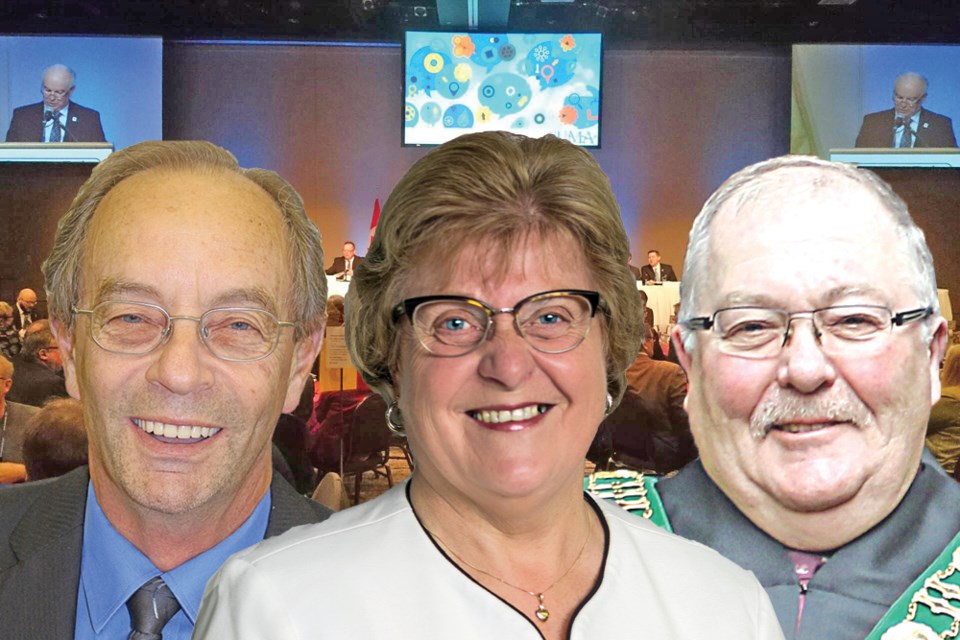The mayors of the region’s three largest communities are optimistic yet nervous about spending cuts from the province after a meeting of Saskatchewan’s urban municipalities.
The Saskatchewan Urban Municipalities Association, which held its convention in Saskatoon from Feb. 5 to 8, was also attended by Premier Brad Wall and the cabinet, who had one key message for the delegates.
“Government repeatedly said there’s no money in the budget,” said Al Jellicoe, Tisdale’s mayor. “Everything’s on the table, even the revenue sharing.”
Each municipality in Saskatchewan shares an amount of money that’s equal to the revenue generated by one per cent of the PST. Rick Lang, Melfort’s mayor, said he’d be upset if the government decided to change that formula.
“I think the feeling of the SUMA delegates was that there was an agreement that was put together that was supposed to be something that was affordable and sustainable,” he said. “I think they have to find other ways to balance the budget other than touching revenue sharing.”
Barry Elliott, Nipawin’s town administrator, said that while the province is looking at all of its programs, it’s been doing so in consultation with SUMA and the Saskatchewan Association of Rural Municipalities. He did say a change in the revenue sharing formula would have an effect.
“It does have an effect, but the town is in a reasonably good financial position. There’s certainly nothing for people to be concerned about,” he said. “We think we’re well-positioned to work with the province in addressing their challenges and meeting our own locally.”
In a question and answer session, Lang asked the government if they considered increasing the PST by one per cent to maintain revenue sharing. The Saskatchewan Party has reduced the PST two percentage points down to five per cent since they took office.
“If you’re going to try to balance the budget by cutting the revenue sharing, it’s ultimately going to mean tax increases anyway, because if you cut our funding, we have to raise taxes, so then you make us look like the bad guys.”
The response was the government hadn’t really talked about it, but it was considering everything.
Jellicoe said communities will have to wait until budget day to see what will happen.
“On March 22, we’re going to have to sit down as a town and see what the effect is. I was hoping we could get our budget before then, but it probably won’t be before the end of March.”
Rennie Harper, Nipawin’s mayor, said she liked the opportunity to hear what the government is thinking.
“Some of those things were enlightening and it makes you think about things and look at things a little different way than you thought it would be.”
Meeting with ministers
The three mayors also scheduled meetings with cabinet ministers to discuss their concerns.
Harper said she met with the social services minister about how an asset cap that prevents those that are above it is leaving social housing vacant in Nipawin and across Saskatchewan. She was told the ministry is reviewing that cap.
She also met with the justice minister about an increase in policing costs if the town reached 5,000 people in the census (it didn’t), the rural and remote health minister about health region amalgamation, the park minister about how the Nipawin Regional Park has only one entrance and exit, the government relations and environment ministers about the water treatment and landfill projects, and the advanced education minister about their relationship with Cumberland College.
“We talked a lot as well about our efforts to work regionally, with the Twin Lakes District Planning Commission and others,” Elliott said. “We talked about our council’s interest in talking with further meetings with our neighbouring First Nations to continue to strengthen relations there and help them to be part of our community as well.”
Lang talked to the health minister about bringing a long-promised CT scanner to the Melfort Hospital and to the highways minister about the Urban Highway Connector Program and how the province and city are supposed to co-operate in making repairs to Saskatchewan Drive and other highways in the city.
“They were receptive, but they did remind me of the financial position of the province,” he said. “At least they reassured me that they haven’t forgotten about us and that those promises are still on the table.”
Jellicoe said he met with four different ministers about projects that relate to the future of Tisdale.




